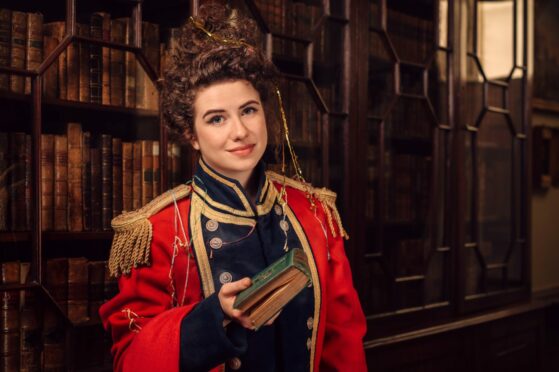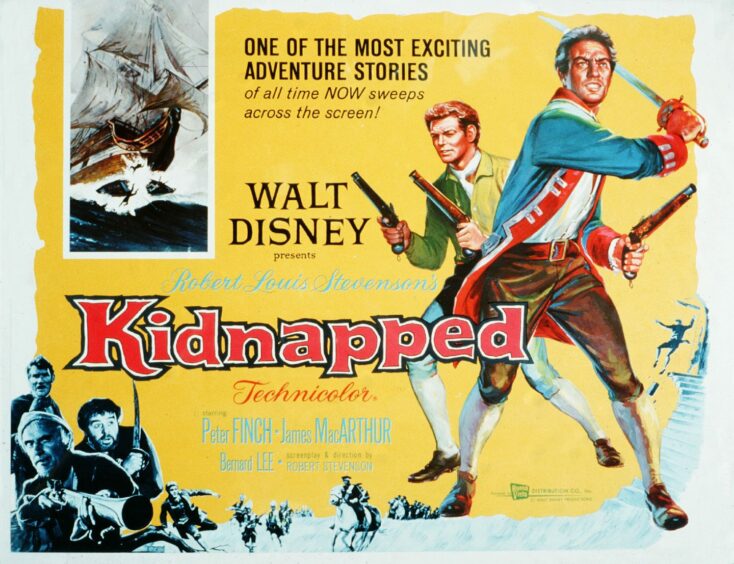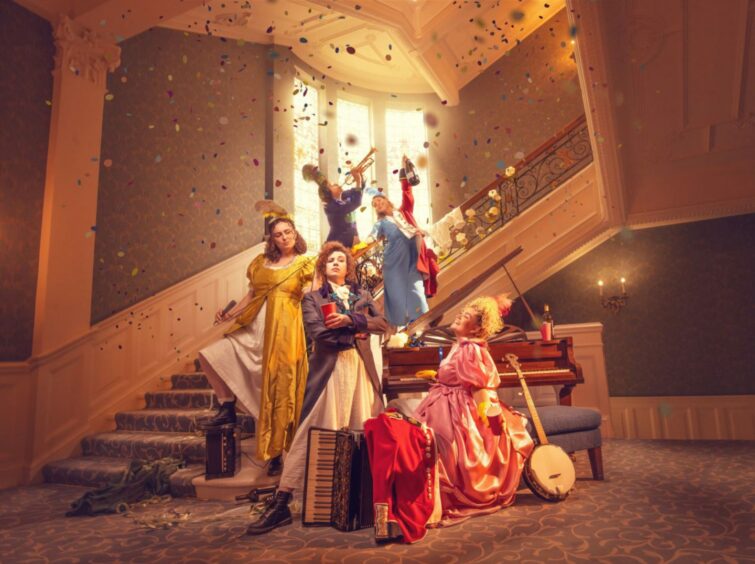
First she came for Jane Austen… and now a rising star of British theatre has revealed why she has Robert Louis Stevenson in her sights.
Isobel McArthur’s startling success – a surging seven-year journey from being a drama graduate struggling to make ends meet to an acclaimed, award-winning actress, writer and director – was sparked by her irreverent, poptastic version of Pride & Prejudice.
Following a low-key debut, the word-of-mouth hit took to the road and earlier this year, following a triumphant West End run in London, picked up a prestigious Olivier award for best comedy. Now it’s back on the road, with the original cast returning home to Scotland this week to play venues considerably bigger than the one where the show started in 2018.
For McArthur, there was no other choice but to take matters into her own hands and, as well as Pride & Prejudice (Sort Of*), she has written a new version of Stevenson’s classic adventure tale, Kidnapped, for the National Theatre of Scotland, driven by laughs, music and a surprise romance.
“It’s about distilling the most joyous and wonderful things about old stories for contemporary audiences,” she said. “I was familiar with Robert Louis Stevenson because I studied Scottish literature but this is a novella I don’t believe has been adapted very often.
“I knew I had to have all of the elements that a good story needs – to be gripping, to be funny and to have a romance. At first, I wondered where the romance was and then I realised it’s there between the two men, Alan Breck Stewart and Davie Balfour, a gay love story subtly hidden.
“Although they declare their love for each other, are physically affectionate and risk their lives for each other, in the scholarly discourse that followed, according to academics, they’re not in love. Stevenson had to write Catriona, a follow-up, where the hero from the first book meets a girl.
“I suppose people think because Kidnapped is a Victorian book it couldn’t possibly be a gay love story but I thought, right, there’s a love story here. We just need to make it explicit and we’re good to go.
“When I researched Stevenson’s wife and discovered the romance in the novel was essentially the romance between her and her husband, I had the idea of making her the narrator, which has been a fruitful one.”
McArthur added: “I also have two original plays I’m working on but one thing my work will always include is some form of music and humour, because those are so inherently theatrical and entertaining to an audience that you can sneak past them more or less anything you want if they’re laughing and being swept up in a musical score. It can be a political message, a heartbreaking story, anything. But you have to entertain them first and, for me, those are the tools to do it.”
No one is more surprised than McArthur at her meteoric rise in recent years from what she described as a tricky start.
“We didn’t have any money or resources when we set up the Blood Of The Young theatre company and it was about seeing who had a bit of floor we could stand on and put on a show, long before there were any commissions or wages on the table,” she explained. “We got two nights in the bar at the Traverse in Edinburgh and two nights at the Vic bar at the Tron in Glasgow.
“We paid for the tech ourselves, wrote the material, got our mates from a local band, Golden Arm, to play, and used props and costumes that was stuff from our flats. Then we got a review that made us sound like a proper company, which was mad.
“It was the only way in for us – we hadn’t done the full BA three-year training course at the Royal Conservatoire; just the one-year Masters. We were putting on our costumes in the public toilets because we weren’t actually performing in the theatre, just the bar. But if you can take yourself seriously, other people will take you seriously if the work is good. You have to make the work you want to be in if you can’t see it anywhere around you.”
McArthur, who studied Scottish literature at Glasgow University before studying drama, adapted Pride & Prejudice after the Tron’s artistic director, Andy Arnold, asked her to reimagine a literary classic.
It was the first time she’d read the Jane Austen novel and she was surprised by how funny it was. Accentuating that humour with a local slant, telling the story from the point of view of five female servants, and throwing in renditions of pop classics like Will You Love Me Tomorrow and You’re So Vain, and McArthur had an irreverent but affectionate hit on her hands.
“Having watched the solemn, po-faced screen adaptations, I assumed that was how the book is, but it’s really funny – full of slapstick, observational, feminist and satirical humour,” she said. “A lot of it was me reinstating the comedy that is in the book, so I can’t take much credit; it’s Austen. You only need to chuck a few things at it, whether it’s pop music or a Viennetta, and then the audience recognises it and they realise they know it and they belong there watching it.
“I was spoiled for choice when it came to the music. Good writing about love is probably going to end up making the same observations throughout the ages so, for me, Jane Austen writing about love and Jarvis Cocker writing about love are saying the same things.
“I had built it in my head for Glaswegians, so I was nervous about how people in Oxford would feel about the gags but I’ve realised we have much more in common than not. That’s been a nice, life-affirming discovery to make about humour and love stories.”
Pride & Prejudice (Sort Of*) is at His Majesty’s Theatre, Aberdeen, from Thursday then Royal Lyceum Theatre, Edinburgh, from October 18 and King’s in Glasgow from November 7

Enjoy the convenience of having The Sunday Post delivered as a digital ePaper straight to your smartphone, tablet or computer.
Subscribe for only £5.49 a month and enjoy all the benefits of the printed paper as a digital replica.
Subscribe
